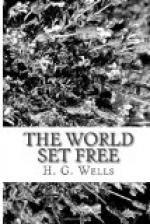Now during this period of two hundred centuries or more, this period of the warring states, while men’s minds were chiefly preoccupied by politics and mutual aggression, their progress in the acquirement of external Power was slow—rapid in comparison with the progress of the old stone age, but slow in comparison with this new age of systematic discovery in which we live. They did not very greatly alter the weapons and tactics of warfare, the methods of agriculture, seamanship, their knowledge of the habitable globe, or the devices and utensils of domestic life between the days of the early Egyptians and the days when Christopher Columbus was a child. Of course, there were inventions and changes, but there were also retrogressions; things were found out and then forgotten again; it was, on the whole, a progress, but it contained no steps; the peasant life was the same, there were already priests and lawyers and town craftsmen and territorial lords and rulers doctors, wise women, soldiers and sailors in Egypt and China and Assyria and south-eastern Europe at the beginning of that period, and they were doing much the same things and living much the same life as they were in Europe in A.D. 1500. The English excavators of the year A.D. 1900 could delve into the remains of Babylon and Egypt and disinter legal documents, domestic accounts, and family correspondence that they could read with the completest sympathy. There were great religious and moral changes throughout the period, empires and republics replaced one another, Italy tried a vast experiment in slavery, and indeed slavery was tried again and again and failed and failed and was still to be tested again and rejected again in the New World; Christianity and Mohammedanism swept away a thousand more specialised cults, but essentially these were progressive adaptations of mankind to material conditions that must have seemed fixed for ever. The idea of revolutionary changes in the material conditions of life would have been entirely strange to human thought through all that time.
Yet the dreamer, the story-teller, was there still, waiting for his opportunity amidst the busy preoccupations, the comings and goings, the wars and processions, the castle building and cathedral building, the arts and loves, the small diplomacies and incurable feuds, the crusades and trading journeys of the middle ages. He no longer speculated with the untrammelled freedom of the stone-age savage; authoritative explanations of everything barred his path; but he speculated with a better brain, sat idle and gazed at circling stars in the sky and mused upon the coin and crystal in his hand. Whenever there was a certain leisure for thought throughout these times, then men were to be found dissatisfied with the appearances of things, dissatisfied with the assurances of orthodox belief, uneasy with a sense of unread symbols in the world about them, questioning the finality of scholastic wisdom. Through all the ages of history there




